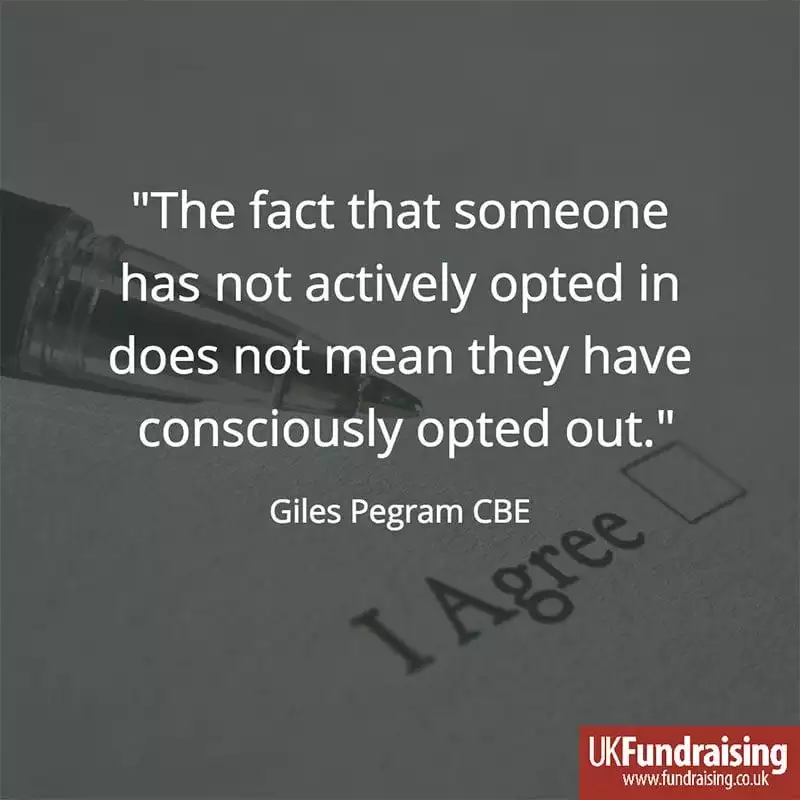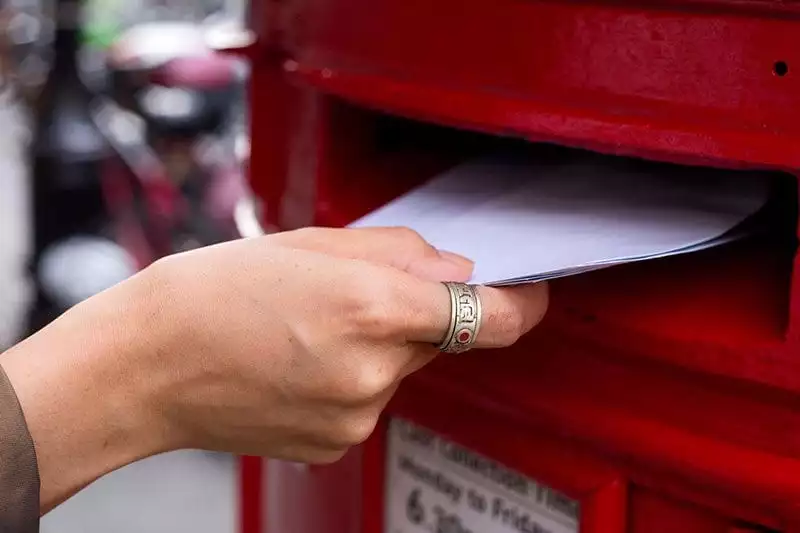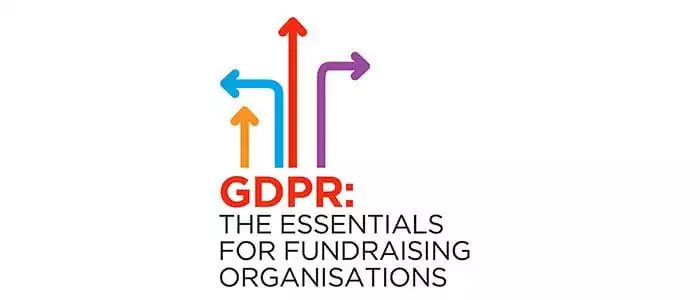Opt-in or opt-out? Consent or legitimate interest?
Confusion reigns. Do donors care? How many beneficiaries will suffer?
Does any individual donor care one iota about the difference between consent and legitimate interest? Yet how would donors feel if they knew the amount of money being spent discussing it, trying to understand it, and debating it? Money that could be spent giving donors better experiences, raising more money and helping more beneficiaries.
Shortly the Commission on the Donor Experience will publish its draft report on Giving donors choices and managing preferences, ahead of the Commission’s scheduled publication date, because of the urgency of the issue.
Advertisement
It will propose, amongst other things, a simple way forward, that will be far more donor friendly than what is currently proposed, and increase, not decrease, donor satisfaction and charity income. One that gives all donors real choice and real control. One that has been proved over decades and can be improved further.
And which would appear to meet in full the requirements of the law.
Where we are now?

Many seem to regard following the consent route, leading to a requirement to opt in, as inevitable.
It isn’t.
If it were to become so, it is almost certain that the voluntary sector would be devastated and dramatically reduce in size.
Some say this could be a good thing. A higher percentage of genuinely loyal and committed donors, but many fewer donors and less money for beneficiaries. I don’t believe this is what most people, or indeed most donors, want.
In my opinion, it won’t happen. People will again realise that the voluntary sector is about enabling donors to make a difference to the world. The essence of charity.
Donors don’t need to be coerced into giving. They just want to hear about the difference they are making.
But by the time that realisation occurs, many charities will have taken what they later realise is the wrong choice, and, for them, it will be too late to turn the clock back.
I hope that common sense will prevail, and normality will return. But when? And how many billions of pounds in long-term income will have been lost in the process?
Why is consent, leading to a requirement to opt-in possibly a bad choice?
The fact that someone has not actively opted in does not mean they have consciously opted out.
This is key.
They may have forgotten to tick the box. They may not have seen it. They may not have even opened the letter. Happy in the belief they are supporting you, however long it’s been since their last gift, they may simply not feel they need to do anything.
Surely no-one believes that all donors read all the words in all the communications from all the charities they support?
Inertia is a very powerful force. There is evidence from behavioural science that confirms this.
In Europe, regarding organ donations, some countries chose opt in, some opt-out.
The difference was quite overwhelming.
When offered the chance to opt out the vast majority, around 80 per cent, took no action, and so were assumed to be in.
When given the same issue but requested to opt in, a similar majority also took no action, so were assumed to opt out.
Inertia played the biggest part in these decisions. Not opting in is no indication of a desire to opt out.
So the donors in this middle group – not actively opted in, but not wanting to opt-out, could be enormous, and will certainly be very significant. And these donors will be denied the chance to give, or even to hear at all.
It is very likely, if not certain, that charities will not be able to feed back to these donors on the impact of their donations, or the work and successes of the charity.
Let alone future needs
The direct debits of regular givers will, of course, continue. But at some point, maybe years down the line, if they do not hear from the charity, these donors will assume their giving is not considered important and, despite inertia, they will cancel their direct debit.
Not only will the sector lose considerable sums of money, and many potential beneficiaries not be helped, but these donors will get a bad experience. They will simply stop hearing from the charities they support. They won’t know what has happened to their donations. They will wonder why? They will be disappointed, and may feel angry that the charity is taking them for granted.
Far from being given choice, these donors will simply feel neglected. And they will be right.
What do the regulators say?
At the moment, the Fundraising Regulator advises: “…opt-in methods as the clearest, safest, most futureproof way of collecting and demonstrating consent”.
Regulator…advice…consent…opt-in…safest. Five very powerful words.
Given what has happened over the last two years, won’t many trustees see that as a clear signal? And take the advice? The problem is that pursuing consent inevitably leads to a requirement that donors have to actively opt in.
Many think that is right. It puts the decision in the hands of the donor.
But, as I have written above, it doesn’t.
Elizabeth Denham, the Information Commissioner, is on record as saying: “It is a long settled ICO view that opt-in consent is best practice as opt-in will generally give consumers greater control.”
This couldn’t be any clearer. But is it right? I say again; many donors won’t realise that, by neglecting to tick a box, they are regarded as having asked to be excluded from further communications. They are simply not being given “greater control”.
Legitimate interest
There is an alternative to consent, legitimate interest, which does not require opt-in.
I am not pretending this is black and white, but why has Elizabeth Denham not told us very clearly about both options?
She writes: “It is important for me to stress that the consultation we have just undergone is on our guidance on consent only….The legitimate interests condition will be dealt with in separate guidance later in the run up to GDPR implementation.”
How much later?
(You can read Ken Burnett’s correspondence with Elizabeth Denham, and his very readable comments.)
(I say what follows to try to be fair. At conferences the Fundraising Regulator says that it always makes clear that there are different options; that trustees have to make choices, which require an understanding of nuances and complexities. Some at the Institute of Fundraising support that that is what the Fundraising Regulator is saying.
I have a different view. I believe the message is very simple and very clear. The message is that all the regulators prefer consent, and that therefore a requirement on donors to opt-in, is ‘safest’, and therefore right, no matter how potentially damaging.)
So?
In short. Charities are being strongly advised to choose consent, and opt-in now.
The draft guidance runs to 39 pages. It could cause potentially catastrophic and irreversible damage. Yet it is so strongly preferred that many trustees would see it as the only practical option. However there is an alternative in law, which could avoid that damage, but on which the ICO has put guidance on the back burner.
Is it just me who is confused?
Aren’t some charities who have chosen opt-in pleased with the initial results?
A report in Third Sector talked about increased response rates, higher average gifts, and improved ROI. In the comments section, half the commentators wrote about success.
But that success came at a price. Potentially millions of pounds of lost net income. The other half of the commentators wrote about that.
It is not response rates, average gifts and ROI that help beneficiaries. It’s net income.
Why are donors different from commercial customers?
GDPR, and the ICO’s guidance, apply equally to charities and commercial entities.
Yet donors are very different from customers.
Customers buy and receive a ‘product’. That is the end of the transaction. It is understandable that such customers might be required to opt-in to any future communications
Donors receive no tangible ‘product’. All they receive are the subsequent communications from the charity. Giving them feedback on what their donation has achieved, recognising them, engaging them, making them feel good, and so want to give again, and feel good about it. This is the ‘product’.
Are there other views?
Ken Burnett shared with me a message he recently received from a French colleague, Gérard Gendre. It is different from my language, and is well worth reading. The translation is Ken’s and may lose a bit of flavour from the original.
“Imagine that the beggars, tramps and donation-seekers whose venerable tradition we pursue must obtain the consent of the people before asking them anything. It would be the end of the “second oldest profession in the world”!
When there is a disaster somewhere, NGOs cannot get prior public approval to call for generosity to help people in distress. By nature, by “essence” the gift is the response to an often unexpected need. It is therefore impossible for anyone to agree to be solicited before doing this act.
The infinite freedom to give is inseparable from the absolute freedom to ask. In addition, every day we receive hundreds of commercial and advertising messages, which we do not need without our consent.
So why should associations that do good things have the approval of our fellow citizens before we can inform them of what they are doing and raise funds from them for the causes that they defend? It’s absurd! It has no moral or legal sense.
The “opt in” would be the death of fundraising.”
What does the Institute of Fundraising say?
The Institute has today published, with legal advice, a paper that lays out simply and concisely what the options are, and the pros and cons of each one. It should be required reading for anyone making decisions, and those that advise them. At last something sensible, that will help charities to make informed decisions.
I could quote at length. I will restrict myself to just one paragraph.
“More haste, less speed – yes, you do need to deal with this and make some decisions. But you should take enough time to make sure that you’re doing it sensibly and with all the right information to make the right decisions for you.”
The Institute’s paper is neutral. It doesn’t make a recommendation.
The Commission on the Donor Experience, though recognising there are different options and complex choices, will put forward one clear option that will not damage fundraising, as I wrote at the beginning
As its name suggests, it starts by wanting to give donors a great experience, And it believes that if we do that, the result will be more money raised in the long term.
What do donors think?
How many have been asked? To what extent have their views been taken into account in all the current debate? I have heard very little.
As I wrote at the beginning, it is highly unlikely that the legal niceties of the concept of consent are of interest to them.
So, what next?
Discussion is currently about minute interpretation of the law, and interpretation of that interpretation.
Surely, as in so many areas, we should start with the donor? What are their aspirations, desires and delights? And what do we know they dislike? Shouldn’t all interpretation of the law flow from that?
The regulators don’t pretend to be fundraisers, but they are deeply committed to donors’ interests.
As fundraisers, we should come together, stop being defensive, and work with the regulators to help them to understand donors, and campaign to get them to change their stance.
(Although I am connected with both the Institute of Fundraising and the Commission on the Donor Experience, the views in this blog are solely my personal views.)
(The Institute of Fundraising is organising courses on GDPR).
4.v.2017
© Giles Pegram CBE
More opt-in fundraising news
- RNLI announces switch from opt-in only to legitimate interest (2 October 2019)
- Over 60% of charity supporters are likely to opt-in if asked (26 June 2017)
- British Red Cross commits to opt-in only for telephone fundraising (1 March 2016)







